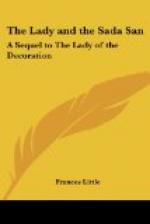For a time I talked at random, directing my whole conversation to him as the law demands. By accident, or luck, I learned that the weak point in his armor of polite reserve was color prints. Just talk color prints to a collector and you can pick his pocket with perfect ease.
My knowledge of color prints could be written on my thumb nail. But I made a long and dangerous shot, by looking wise and asking if he thought Matahei compared favorably with Moronobo as painters of the same era. I choked off a gasp when I said it, for I would have you know that for all I knew, Matahei might have lived in the time of Jacob and Rebecca, and Moronobo a thousand years afterwards. But I guessed right the very first time and Mura San, with a flash of appreciation at my interest, said that my learning was remarkable. It was an untruth and he knew that I knew it, but it was courteous and I looked easy. Then he talked long and delightfully as only lovers of such things can. At least, it would have been delightful had I not been so anxious to see Sada alone. But it was not to be. At least, not then. But mark one for me, Mate: Uncle was so pleased with my keen and hungry interest in color prints and my desire to see his collection, that he invited me to a feast and a dance at the house the next night.
The following evening I could have hugged the person, male or otherwise, who called my dear host away for a few minutes just before the feast began.
Sada told me hurriedly that Uncle had insisted on her singing every night at the tea-house. She had first rebelled, and then flatly refused, for she did not like the girls. She hated what she saw and was afraid of the men. Her master was furiously angry; said he would teach her what obedience meant in this country. He would marry her off right away and be rid of a girl who thought her foreign religion gave her a right to disobey her relatives. She was afraid he would do it, for he had not asked her to go to the tea-house again. Neither had he permitted her to go out of the house. Once she was sick with fear, for she knew Uncle had been in a long consultation with the rich man Hara and he was in such good humor afterwards. But Hara, she learned, had gone away.
She would not sing at these dinners again, not if Uncle choked her and what must she do! I saw the man returning but I quickly whispered, “What about Billy?”
Ah, I knew I was right. The rose in her hair was no pinker than her cheeks. If Billy could only have seen her then, I would wager my shoes—and shoes are precious in this country—that her duty to her mother’s people would have to take a back seat.
Before Uncle reached us I whispered, “Keep Billy in your heart, Sada. Write him. Tell him.” And in the same breath I heartily thanked Uncle for inviting me.




